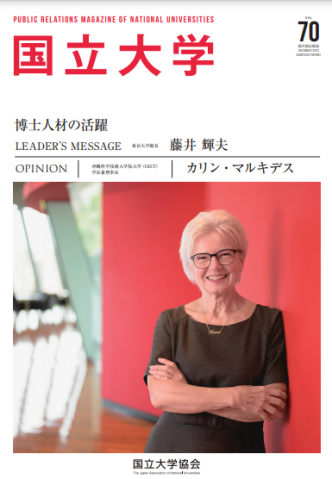The Japan Association of National Universities' magazine featured Dr. Karin Markides

An interview was published in "National Universities," a publication of the Japan Association of National Universities. The article is in Japanese and was translated by OIST with permission from the publisher.
To create a society where human resources with doctoral degree play an active role
Understanding what Japan needs today
Japan is making a national effort to develop doctoral human resources.
There is a common understanding that doctoral personnel are indispensable for the development of industry as well as the expansion of the PhD holders to improve research capabilities.
However, the reality is that the number of PhD holders who are active in society is still very small.
What should doctoral personnel be like and how should they be trained?
Dr. Markides, who has been involved in research, education, and university management in Europe and the U.S., is now the president of a distinctive graduate university, spoke with a perspective of western countries where doctoral human resources play an active role in society.
Karin Markides, President, Okinawa Institute of Science and Technology (OIST)
Ethical Leaders in the Creation of New Knowledge and Possibilities
The first question I wanted to ask was what kind of person Dr. Markides thought doctoral human resources should be. In response to this question, Dr. Markides began by discussing the difference between the ideal education of a doctoral program and an undergraduate program.
Dr. Markides began by saying, "I think doctoral programs and undergraduate education are completely different. In an undergraduate program, students are taught to understand and apply existing knowledge. On the other hand, in a doctoral program it is required to create new knowledge and possibilities. If undergraduate education is for students to be able to demonstrate their abilities as a member of a team, doctoral education should focus more on the development of ‘individual’ abilities. Faculty members must also consider not only what they teach, but also what is more beneficial learning to the individual.”
This will foster doctoral human resources as "knowledge leaders" who will lead society, Markides explained.
“I have always believed that leaders must be ethical, and in reality, many things are being lost because they are not. So what is the basis for that ethics? I think that is the 'validated knowledge' that only doctoral human resources should be trained to possess."
What one learns in an undergraduate program is not something that mobilizes knowledge from many fields. In the doctoral program, on the other hand, students are trained from the viewpoint of "how to look at things through what kind of glasses. For example, our society is under pressure to change from an oil-dependent society to a recycling-oriented society, which requires a change in the way we think. She said that doctoral human resources have such training, which is the basis for being "ethical".
“To do this, of course, one must always be at the forefront of knowledge, but, it is very dangerous to become siloed and isolated because of over-specialization, or because of disconnect to the specialization.”
Currently, doctoral students are required to delve into a narrower scope of research, but Markides points out that "it is now a volunteer work, not an education.”
“It's a systemic problem, and I can't blame the instructors for letting that happen, but it's not good for the students, and it's not good for the country of Japan, so it should stop."
Shared Governance
Important in the Development of Doctoral Human Resources
So, how should doctoral human resource development be conducted? One answer is to "develop the ability to connect with society," and in order to do so, Dr. Markides says, it is necessary to rethink university governance.
“In recent years, especially in the case of national universities, I feel that university governance has become more controlled and that researchers themselves no longer need to develop transformative leadership and governance skills. This is because if you work as part of the system, you can do your job. However, university governance must essentially be bottom-up, with researchers and students having decision-making authority. This is because to be a strong organization, each individual must lead the development. This is not an easy task, but it is not impossible. In fact, at my former university in Sweden, the researchers took the initiative in governance, and by following through and keep the engagement open, we were able to obtain the largest research grant in Europe, despite being a small university.”
What is required is a form of shared governance, in which people in different positions share decision-making authority and responsibility so that each individual can perform better than he or she could alone.
“However, no one understands the correct way to do this yet. At OIST, we are working on shared governance ourselves and trying to develop it as a tool, if this kind of governance concept permeates the university and professors, I think doctoral students will be better able to connect with society and enable a sustainable future.”
While it may seem difficult to devote time to governance when one is expected to produce research results, Dr. Markides explains that "looking only at one's own research leads to a disconnect with those around you, and ultimately takes time away from research as well as risk of missing inspiration for intersections between knowledge areas. ”
“Naturally, the most important thing for a researcher is to do research and to stay at the forefront of knowledge. But I have actually seen examples where professors have achieved better results for the research group by nurturing the different personalities of each student. With five to ten students in a research group, each student has different interests, personal preferences, and skills: some are interested in communication, some have leadership skills, some have an entrepreneurial spirit, and so on. By nurturing their individuality and allowing them to demonstrate their strengths in their areas of research specialization, the research group can reach both leading edge and broad impact. From such a group, we can also get more ideas for research.”
However, it is difficult to secure the necessary number of students after the rigorous selection process required for the doctoral program. When I told her this, Dr. Markides smiled and said, "I think OIST has a more rigorous selection process.”
“The important thing is how to attract candidates. If you don't communicate what you will learn and take with you from the doctoral program, it is natural that the people you are looking for will not apply. Only by communicating that you will be able to develop your personal abilities and demonstrate leadership in society will you attract people with those qualities.”
To broaden the pathway for doctoral human resources, we need to dialogue directly with the CEO first
The post-doctoral problem is one of the things that shocked Dr. Markides about the doctoral workforce in Japan.
“According to statistics, many people continue their research as post-doctoral fellows after obtaining their doctorate. But postdoctoral fellowship is a kind of training, not a 'job' in which one can demonstrate one's individual abilities.”
The reason why students remain at the university and continue their academic research after obtaining a doctorate, rather than going out into the world, is also because they themselves do not consider any other possibilities. Behind this is a strong belief on the part of supervisors that doctoral human resources should be engaged only in academic research.
“In other words, students are not offered any other option. If that is the case, I think we must prepare students for the possibility of working outside the university by giving them experience working with private companies, public institutions, and other external organizations while they are still in the university. Of course, research in industry is different from the purely curiosity-based research that is done at universities. However, a study conducted in Sweden showed that collaboration with industry may produce more basic research projects than universities could do individually.”
Basic research conducted by universities commonly has a funding agency to provide funding, and in order to obtain funding, one must explain "what the research is about" and "what kind of results it will produce”. But in fact, this approach "does not allow for free and open-minded basic research that is truly based on curiosity," says Dr. Markides.
“Rather, it is better to be in an environment where there is some agenda and you can decide for yourself what you are going to work towards, so that you can do free and open research. If universities were to open up their connections to society and increase opportunities for free and precompetitive research based on curiosity, doctoral talents would move on their own. Some may even start their own businesses or become politicians by making use of the networks they established at the forefront of their fields while at university. We must change the ‘culture’ of universities in order to bring out such individuality.”
However, the reason why doctoral human resources are not leaving the university is also because there are no positions available in industry to begin with. Dr. Markides suggests "direct dialogue with CEOs" as an idea to change the mindset of the industrial world.
“There are many powerful multinational corporations in Japan, and they have plenty of money, and at least at the management level, they believe that they must survive and change with society. And these companies are already cooperating with universities abroad.
So the quickest way to change the mindset of Japanese companies is to have direct discussions between the CEOs of these multinational companies and universities, and to have them cooperate with Japanese universities in precompetitive projects as well. The key is to understand how to build trust and build a strategic multi-coupled process. That way, the companies will understand what topics to work with the universities on.”
By creating opportunities to work with the outside world, presenting options, and by developing individualized competencies, students can find a place where they fit in. On the other hand, they also need to produce excellent results in their research for their doctoral degree. To balance these needs, it is also important to find what kind of research collaborations to engage in with external parties.
“The important thing is to collaborate not on known products, but on products before they are commercialized. That is another reason why you should connect directly with the management level. You don't have to be in a university to work with what is unknown, but a university should be there 'to implement unexpected knowledge for tomorrow’.”
To be creative, you need diversity, to be diverse, you need fluidity.
Incidentally, in Dr. Markides' former laboratory, not a single PhD student remains, and all of them leave the university. The university welcome postdocs, but for up to four years at most. Therein lies the idea that "mobility is important for good research”.
“There is talk that we have no choice but to send excellent students out because there are no positions available within the university, but I think it is a mistake not to send excellent students out. If you decide for yourself who is excellent among those you have brought up, you will end up choosing people who are similar to you. You will not get diversity if you pick and choose your own team in that way. A university is a place where a creative culture should be created, and to be creative, diversity is very important. Fluidity is essential for that."
Of course, to increase mobility, you need to have positions. “If joint research with society begins at the local, national, and global levels, positions will naturally be created and mobility will be created,” Dr. Markides says, but the current situation is a vicious cycle in which the number of doctoral talents is not increasing due to the lack of positions after obtaining a doctoral degree, which means there are no job opportunities. Is there any wisdom to change this situation?
“How about starting by accepting doctoral students as interns and building a relationship of trust with them? If they only accept students at the field level, the same thing will eventually happen again, so we need to have them accept them at the strategic level. This is another reason why we believe that 'dialogue with the CEO is necessary’. I also mentioned ‘Japanese multinationals’ as a candidate for collaboration earlier, but one way might be to start with European companies that have subsidiaries in Japan. They already have a 'culture' of interacting with universities, so it might be easier to establish a connection.”
If you want to increase the number of female doctoral human resources, first of all, you need to show your "welcoming" attitude.
The low number of women in the doctoral workforce, and the fact that influential positions are occupied exclusively by men, has long been seen as a problem for Japanese universities, but it is one that has not been solved.
“The heart of the university is creativity. Creativity is based on diversity and inclusiveness. If we do not create a diverse environment as soon as possible, creativity will be lost, and it could become a matter of life and death. In accepting women, the idea that 'it's OK because we accepted a certain percentage of them' is the most foolish idea. It does not mean that the quota system is wrong, but it does mean that it is wrong to think only about the numbers. That is not the way to recruit competitive talent.”
The key, says Dr. Markides, is to develop women as competitive candidates, and this requires intervention from high school or even earlier.
“For example, universities could take on female high school students as interns and work with them on research projects. If, in such experiences, female students feel they can do more than boys, it will help build their confidence. If it seems too late in high school, we may need to go back to age 10 or so. Preparation needs to begin while boys and girls alike are equally curious and can say things without reservation."
She also points out that if female students are reluctant to continue their research, it may be because they feel that they do not have equal opportunities in this world.
“First, we need to make women feel 'welcome’. Otherwise, they will have to 'fight' to make a statement, and it will be harder and harder to build trust with existing members.”
One of Dr. Markides' key arguments is that it "doesn't necessarily have to be the women themselves" who speak up to make these changes.
“You don't represent only your own attributes in any type of institution. You don't have to be a woman to speak up for women. Specifically, I think the person with the most authority in the group should be responsible for initiating change."
Incidentally, in Dr. Markides' home country of Sweden, kids are trained from an early age to work for the community, after which they develop their individuality. They have learned how to "not represent themselves”. This is very different from the American approach, which begins by nurturing the individual, but it seems that Japan can learn a lot from the Swedish approach.
“I would like the leaders of existing groups to think about cooperating with, rather than fighting against, the new women who join their groups. Their presence is not a threat to the existing members, but adds value. That is what diversity means, and the significance must first be understood. Conversely, funds should not be invested before its significance is understood. This is because investing resources in the status quo could reinforce the current state of affairs.
Defining the role that universities should play will expand opportunities to connect with society.
Finally, we asked her what message she had for Japan's national universities.
“What I strongly believe is that, at a time when society is in need of change, universities must change along with society. In order to be trusted by society, universities must first clarify what their role is. In particular, national universities are deeply connected to the nation, and I believe that they have a responsibility to all stakeholders as an entity that can play a role that is truly needed by society.”
This requires cooperation as well as competition among universities.
“Competition is necessary, but we also need respect and trust for each other. It is wrong to be constantly competing and not working together. Even companies cooperate to set common standards in their industries, so universities should definitely be able to cooperate as well. Many people in Europe have high expectations of Japan and want to work together. They also want Japan to become stronger and be part of democratic development. I myself respect Japan as a country. If we can help correct small stumbling blocks by working together, I am happy to help."
Profile
Karin Markides
Born in Sweden in 1951. Dr. Karin Markides earned her doctorate degree from University of Stockholm. After serving as President and CEO of Chalmers University of Technology in Sweden as well as American University of Armenia, she has been in her current position since June 2023. Dr. Markides specializes in analytical chemistry. Dr. Markides has been appointed for life as Chair Professor of Analytical Chemistry Science and Engineering at Uppsala University in Sweden as well as Elected Member of the Royal Swedish Academy of Sciences (KVA) and has been involved in the selection of the Nobel Prize in Chemistry and the promotion of science for society, schools, and academia. She is also a mentor and board member of Einride, a start-up company founded by the alumni of Chalmers University of Technology, and has led industry by serving on scientific advisory boards for various companies.
Photo caption:
“Doctoral human resources are capable of creating new possibilities. They are the ones who can change the way people think and change society," Dr. Markides said.
In order to take advantage of this ability, she believes that "they should establish contacts with the public and private sectors while they are still in school.














